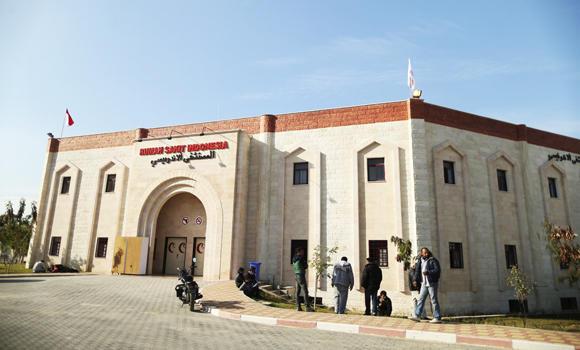gaza.jpg" alt="The new hospital, built by the Republic of Indonesia, (Photo: MER-C)" width="338" height="225" /> The new hospital, built by the Republic of Indonesia, (Photo: MER-C)
Gaza, 29 Rabiul Awal 1437/9 January 2016 (MINA) – The Gaza Strip’s struggling health care system will get some much needed help in 2016 after the first new hospital in a decade opened its doors in the territory last month and as two more foreign-funded clinics are set to launch this year.
This hospital will be inaugurated simbolicaly in Jakarta today (9/1) by Indonesian Vice President Jusuf Kalla, attended by foreign and domestic officials including Palestinian Healt Minister Jawad Awad.
Awad landed in Jakarta the day before and met its counterpart Nila F. Moelek and also chief of the house of resentative Fadli Zon, and several officials.
After nearly five years of construction, with delays caused by fighting and restrictions on imports imposed by Israel and Egypt, the Indonesia Hospital opened its doors on December 27 and has since been treating more than 250 patients a day.
Also Read: Death Toll in Gaza Nears 70,000 Amid Ongoing Israeli Aggression
Built on a hilltop outside Jabalya, Gaza’s largest refugee camp, it serves 300,000 people who live in the far north of the territory, an area hard hit in the conflict with Israel in 2014, Reuters reported.
Zionist forces’ heavy aerial bombardment of the densely populated Gaza Strip killed 2,100 people, mostly civilians, according to Palestinian officials, and caused widespread destruction, IINA reports.
Funded by an Indonesian NGO, the $9 million facility has 110 beds, compared to the 62 beds of the old local hospital, and will make a big difference to the local population, said Muaeen Al-Masri, its head of media and public relations.
Gaza, home to nearly 2 million people, has around 30 hospitals and major clinics, providing an average of 1.3 beds for every 1,000 people, according to the World Bank.
Also Read: UNRWA Warns of Ongoing Destruction and Mass Displacement in West Bank Refugee Camps
By comparison, Israel has an average of 3.3 beds per 1,000 and the European Union 5.4 per 1,000.
Ashraf Al-Qidra, spokesman for the Palestinian Health Ministry, said there was a shortage of doctors in Gaza, especially trained physicians and surgeons.
Seriously ill patients must travel to Israel, Egypt and beyond if they need specialist medical treatment, he said.
Because Israel only admits death-threatened patients and Egypt keeps its border crossing with Gaza largely closed, hundreds of lives are at risk, said Qidra.
Also Read: Dozens of Settlers Defile Aqsa Mosque Under Heavy Police Protection
The largest hospital in the territory is Shifa, in the center of Gaza City, with 750 beds. (T/Imt/R04)
Mi’raj Islamic News Agency (MINA)
Also Read: Hamas Urges Global Intervention to Halt Killings and Abuse Inside Israeli Prisons
































 Mina Indonesia
Mina Indonesia Mina Arabic
Mina Arabic